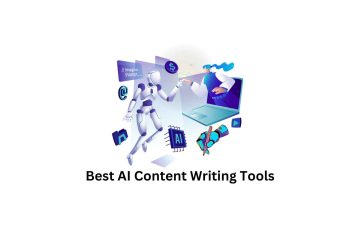Introduction
The world of digital marketing is constantly evolving and with the rise of artificial intelligence, it is changing the game in many ways. In this blog, we will explore the impact of AI in digital marketing and what it means for the future of search engine optimization (SEO), affiliate marketing, and search engines.
The Future of SEO with AI

First, let’s discuss the role of AI in SEO. AI algorithms are already being used to analyze vast amounts of data to improve search rankings, identify keywords and content that perform well, and to detect spam and other negative factors that impact search results. As AI continues to advance, it is likely that it will become even more sophisticated in its ability to analyze data and help websites achieve higher search rankings.
Improving Content Quality and Relevance
One of the key ways that AI is helping with SEO is by analyzing the quality and relevance of website content. AI algorithms can identify keywords that perform well, determine the quality of the content, and detect spam and other negative factors that impact search rankings. This information is then used to suggest changes to the website that will improve its search rankings.
Analyzing Customer Behavior
Another way that AI is improving SEO is by analyzing customer behavior. AI algorithms can analyze data from search engines, social media, and other sources to identify patterns in customer behavior. This information is then used to target SEO campaigns more effectively and to improve the overall customer experience.
Improving Speed and Efficiency
In addition to improving the quality and relevance of website content, AI is also helping to improve the speed and efficiency of SEO. AI algorithms can analyze data in real-time, allowing websites to quickly make changes to improve their search rankings. This is especially important in a fast-paced and constantly evolving digital landscape where it is crucial to stay ahead of the competition.
Optimizing for Voice Search
Finally, AI is expected to play a big role in the future of voice search optimization. As more and more people are using voice-activated devices to search the web, it is important for websites to optimize their content for voice search. AI algorithms can help identify which keywords and phrases are most likely to be used in voice search, allowing websites to optimize their content for voice search more effectively.
Affiliate Marketing with ChatGPT

Next, let’s talk about the potential of affiliate marketing with ChatGPT. With its ability to process natural language input and provide quick, relevant responses, ChatGPT has the potential to revolutionize the way we do affiliate marketing. This advanced technology could help brands and marketers connect with potential customers in a more personal and conversational way, leading to more conversions and better customer engagement.
Personalized Recommendations
One of the key benefits of using ChatGPT for affiliate marketing is the ability to provide personalized recommendations to users. ChatGPT can analyze data about a user’s preferences, behavior, and past purchases to make recommendations that are relevant and valuable to them. This not only improves the user experience, but also increases the likelihood of making a sale through the affiliate link.
Improved Engagement
ChatGPT can also be used to improve engagement and build trust with users. By providing users with relevant and valuable information, ChatGPT can help establish a relationship with them and build trust in the brand. This can lead to increased conversions and higher commissions for affiliate marketers.
Increased Conversion Rates
Another benefit of using ChatGPT for affiliate marketing is the potential to increase conversion rates. By providing users with personalized recommendations and relevant information, ChatGPT can help guide users towards making a purchase through the affiliate link. Additionally, the use of chatbots and other conversational interfaces can make the purchasing process smoother and more streamlined, further increasing the likelihood of a sale.
ChatGPT has the potential to revolutionize the world of affiliate marketing by providing a more personalized and engaging experience for users. By using ChatGPT to make personalized recommendations, improve engagement, and increase conversion rates, affiliate marketers can improve their performance and earn higher commissions.
Machine Learning in Digital Marketing
Machine learning is a form of artificial intelligence that allows computers to learn from data without being explicitly programmed. It is quickly becoming a critical tool in the world of digital marketing, providing marketers with new and innovative ways to reach and engage with customers.
In digital marketing, machine learning is used to analyze large amounts of data to identify patterns and make predictions. This information is then used to improve targeting, personalization, and overall campaign performance.
Improving Targeting
One of the key benefits of using machine learning in digital marketing is the ability to improve targeting. Machine learning algorithms can analyze data about customer behavior and preferences to identify the most effective target audience for a particular campaign. This allows marketers to reach the right people with the right message, improving the overall effectiveness of their campaigns.
Personalization
Another benefit of using machine learning in digital marketing is the ability to personalize campaigns for individual customers. Machine learning algorithms can analyze data about a customer’s behavior, preferences, and past interactions with a brand to create highly personalized experiences. This can lead to increased engagement, loyalty, and conversions.
Optimizing Campaign Performance
Machine learning can also be used to optimize the performance of digital marketing campaigns. Algorithms can analyze data about campaign performance in real-time, identify areas for improvement, and make suggestions for optimization. This allows marketers to quickly and easily make data-driven decisions to improve the performance of their campaigns.
Predictive Analytics
Finally, machine learning can be used for predictive analytics in digital marketing. By analyzing data about customer behavior, machine learning algorithms can make predictions about future behavior, allowing marketers to anticipate customer needs and make data-driven decisions.
Machine learning is quickly becoming a critical tool in the world of digital marketing. With its ability to improve targeting, personalization, and optimize campaign performance, machine learning is helping marketers to reach and engage with customers in new and innovative ways. As machine learning continues to evolve, it is likely that it will play an even bigger role in shaping the future of digital marketing.
The Future of Search Engines
Search engines have come a long way since their inception and continue to evolve at a rapid pace. With advancements in artificial intelligence and machine learning, the future of search engines looks bright and filled with new and innovative possibilities.
In recent years, search engines have become more sophisticated, providing users with more relevant and personalized results. As technology continues to advance, search engines will only become more advanced and capable of delivering even more accurate and relevant results.
Artificial Intelligence
Artificial intelligence is set to play a significant role in shaping the future of search engines. AI-powered search engines can analyze vast amounts of data and provide users with personalized and relevant results. Additionally, AI can be used to improve the speed and accuracy of search results, making the search experience faster and more efficient.
Voice Search
Voice search is another technology that is set to have a big impact on the future of search engines. As more people use voice assistants like Siri, Alexa, and Google Assistant, the importance of voice search will only continue to grow. Search engines will need to optimize for voice search to ensure that they can provide users with accurate and relevant results in a format that is easy to use.
Predictive Search
Predictive search is another technology that is set to shape the future of search engines. Predictive search uses machine learning algorithms to predict what a user is searching for based on their behavior and past searches. This allows search engines to provide users with relevant results even before they have finished typing their query.
Contextual Search
Contextual search is another technology that is likely to shape the future of search engines. Contextual search takes into account the context of a search query, including the user’s location, time of day, and other relevant information, to provide more accurate and relevant results.
The future of search engines is bright and filled with new and innovative possibilities. With advancements in artificial intelligence, voice search, predictive search, and contextual search, search engines will continue to evolve and provide users with even more accurate and relevant results. As the world of technology continues to advance, it will be exciting to see what the future holds for search engines.
Conclusion
In conclusion, AI is rapidly changing the digital marketing landscape and has the potential to revolutionize the way we approach SEO, affiliate marketing, and search engines. With its ability to analyze vast amounts of data, provide personalized experiences, and streamline marketing processes, AI is poised to have a profound impact on the future of digital marketing.

Hello, I’m Ali Raza, the brain behind Digital Realm Trends.
Hailing from the vibrant world of digital marketing, I’ve honed my skills over years. Based on my experience, I’m here to unravel the complexities of digital marketing, analytics and paid marketing, crafted for individuals like you. Join me in uncovering the power of digital marketing tools and strategies, fueled by experimentation and insights.




